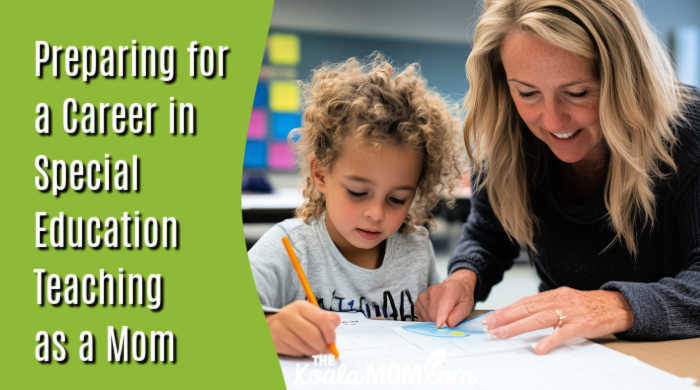If you’re a mom considering a career in special education teaching, you’re on the path to making a profound difference in the lives of children with diverse learning needs. This fulfilling field requires patience, dedication, and specialized training. As a mom, you are uniquely equipped to do this role as you already have experience in meeting your child’s needs.
In this article, we’ll walk you through the key steps to transition into this rewarding career, from meeting educational requirements to balancing work and family life.

Meet Educational and Certification Requirements
Most states require a bachelor’s degree in special education or a related field, along with a teaching license. If you already have a degree in another subject, you may need to complete a teacher preparation program specializing in special education. Many colleges and universities offer these program as one- or two-year diplomas or after degrees, which can often be completed online or part-time.
One crucial step in becoming a certified special education teacher is to pass the required exams. You may want to take a look at the requires exams and certifications in your state or province before beginning your training. For example, to prepare for Praxis 5354, consider using study guides, online practice tests, and review courses.
As a busy mom, you can study in short, focused sessions, perhaps during nap times or after the kids go to bed. Part of the reason my toddler went to preschool while I was doing my second degree was so that I’d have time to study while she was having fun. Breaking your study plan into manageable chunks will help you stay on track without feeling overwhelmed.
Gain Hands-On Experience
If you’re new to the field, consider volunteering at local schools, community centers, or nonprofit organizations that support children with special needs. Some teacher preparation programs also include student teaching placements, which provide real-world classroom experience.
As a mom, you may already have experience advocating for your own children, whether in school meetings or therapy sessions. These skills translate well into special education, where collaboration with parents, therapists, and administrators is key.
Balance School, Work, and Family
Leverage your existing multitasking skills by creating a flexible schedule around family commitments. Online programs, evening classes, and digital tools can help manage coursework during pockets of available time. Open communication with professors about parental responsibilities often leads to helpful accommodations.
A strong support network proves invaluable–enlist family, friends, or childcare providers for practical assistance. For example, my aunt and a neighbour provided childcare for me while I finished my second degree. During exams or when big assignments are due, you may have to arrange extra childcare. Parent-educator communities offer both resources and moral support. Segment your goals into achievable milestones, celebrating each accomplishment to maintain momentum.
Prioritize self-care by setting boundaries and scheduling brief respites. Recognize that progress naturally ebbs and flows. Your parenting-honed organizational skills and empathy already position you for success in special education.
This dual journey, though challenging, offers unique rewards. Your maternal resilience and patience will enhance your teaching, creating meaningful impacts in students’ lives while advancing your family’s future. It can also provide an example for your children of pursuing your dreams and always learning. The temporary balancing act yields lasting professional and personal fulfillment.
Develop Essential Skills for Special Education Teachers
Special education requires three core competencies: adaptive instruction, collaborative communication, and behavior management. Teachers must customize lessons for diverse needs, coordinate with support teams, and implement positive behavior systems.
Parenting develops directly transferable abilities: individualizing approaches for each child, advocating with educators, and maintaining consistent behavioral expectations. These experiences provide practical preparation for special education classrooms.
Mothers entering the field possess natural advantages. Their caregiving experience, combined with professional training, creates strong special educators. Many successful teachers attribute their effectiveness to skills first developed through parenting.
Find the Right Job Opportunity
Once you’ve met certification requirements, it’s time to start job hunting. Look for positions in public schools, private institutions, or specialized programs.
Many schools offer part-time or paraprofessional roles, which can be a great way to ease into the field while maintaining family responsibilities. Professional networking can also open doors. Join online forums, attend local education workshops, or connect with special education groups on social media.
Embrace the Emotional Rewards and Challenges
As a mom, you likely understand the patience, empathy, and resilience required to support children with unique needs. In the classroom, these qualities will shine as you help students overcome obstacles, celebrate their milestones, and foster their confidence.
However, the role also comes with emotional challenges. You may encounter difficult moments, such as advocating for resources in underfunded systems or managing the emotional weight of students’ struggles. Your experience as a parent will prepare you for these realities.
Remember, self-compassion is key. Lean on your support network, set healthy boundaries, and take pride in the difference you’re making. The joy of seeing a student thrive because of your dedication will far outweigh the challenges, making this career uniquely rewarding for moms who are called to it.

Bottom Line
Transitioning into a career in special education teaching as a mom is an ambitious yet achievable goal. By leveraging your natural strengths, staying organized, and seeking support, you can successfully navigate the certification process, gain experience, and make a meaningful impact in the lives of students with special needs. Through dedication and genuine enthusiasm, you can create a fulfilling career that successfully blends your professional goals with family priorities.

No Responses Yet